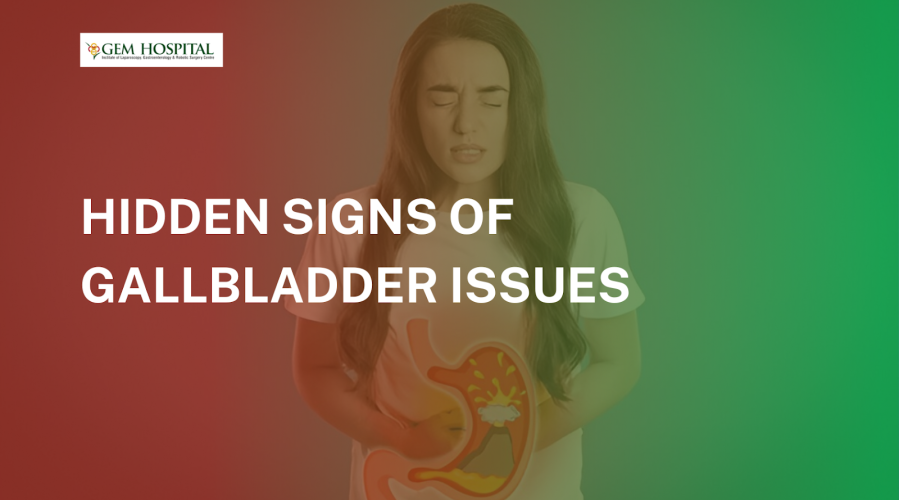Learn what gallstones are, their common symptoms, causes, and treatment options. Discover when to seek medical care and how to manage gallstone complications effectively.
Silent Signs Your Gallbladder Might Be in Trouble

The gallbladder is a small organ that aids in the digestion process by storing bile, which is a substance needed to break fats down. Though small, the gallbladder is a crucial part of your digestive system. Many times the symptoms are not obvious when something goes wrong with the gallbladder. Most people don’t take these early warning signs seriously, which can bring major Gallbladder problems down the line.
In this article, we will explore a few silent symptoms that your gallbladder is troubled.
1. Frequent Bloating and Indigestion
If you regularly feel bloated after eating, particularly fatty foods, it may be a sign of gallbladder problems. Gall bladder is an organ that helps in digesting fats, thus when it is not functioning well, digestion becomes difficult. You might feel uncomfortable, burp, or have a lead weight in your stomach.
2. Pain in the Upper Right Abdomen
Pain that is dull or sharp, on the upper right side of your stomach, just below the ribs, can signal gallbladder trouble. This pain can be intermittent, usually after eating oily or spicy food. If the pain becomes intense and lasts for hours, it could signal gallstones or inflammation.
3. Nausea and Vomiting
Regular nausea, vomiting without any explanation can be associated with Gallbladder problems. If you experience nausea after consuming rich, fatty meals, or have persistent nausea, it might be time to check in on your gallbladder health.
4. Unexplained Fever and Chills
Sudden fever or chills in the absence of an infection could be a sign of gallbladder inflammation. When that happens, it means your gallbladder is inflamed or infected, which can become a serious issue called cholecystitis that requires medical attention. Never disregard a high fever with stomach pain.
5. Changes in Stool and Urine Colour
Your gallbladder stores bile, a digestive fluid that also gives stool its normal brown color. If your stool looks pale or clay-colored, that could be a sign that bile is not flowing properly into your intestines. Likewise, dark urine can be a sign of bile flow problems, which are often linked to Gallbladder problems.
6. Jaundice (Yellowing of Skin and Eyes)
If gallstones or other problems block bile flow, it can lead to jaundice. This causes skin and eyes to turn yellow. If you do, then it is essential to seek medical care right away, because it may signal a serious problem with your gallbladder. Early Gallbladder Treatment can prevent complications.
7. Sudden Loss of Appetite
If you’re starting to lose interest in food or feel full when you don’t eat very much, that may be a quiet symptom of gallbladder disease. Because the gallbladder is involved in digestion, problems with it can impact your appetite levels.
8. Pain Spreading to the Shoulder or Back
Gallbladder pain does not always stay in one place. Sometimes, it can spread to your right shoulder or back. If you experience pain in these areas along with digestive discomfort, your gallbladder may be the cause, indicating Gallbladder problems.
When Should You See a Doctor?
If you notice any of these symptoms regularly, you should seek medical attention. Overlooking gallbladder problems can cause complications such as infections or the development of additional gallstones, for which one may need to be surgically operated. With early diagnosis, the condition may be manageable simply by lifestyle changes or medications.
Your gall bladder may not be an organ you think of very often but knowing about these silent signs could help you avoid some serious health problems. If any of the above mentioned symptoms sound familiar, do not wait for the condition to worsen.
Get gallbladder health advice and treatment from the experts at GEM Hospital.
Blogs & Article
Learn about bloating and gas problems, including common causes, symptoms, and effective solutions to improve digestion, reduce discomfort, and maintain gut health.
Learn how unverified Ayurveda treatments may cause liver damage, understand the risks, symptoms, and why medical guidance is essential for safe care.


